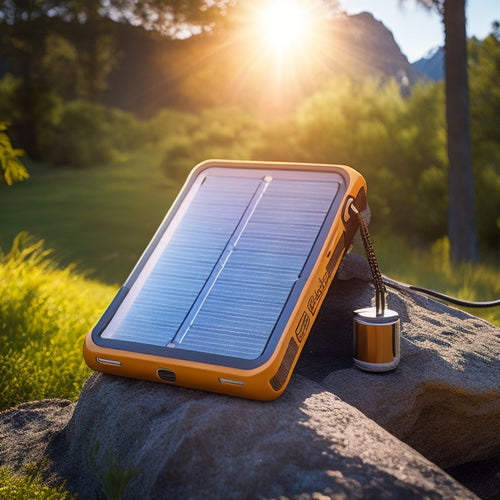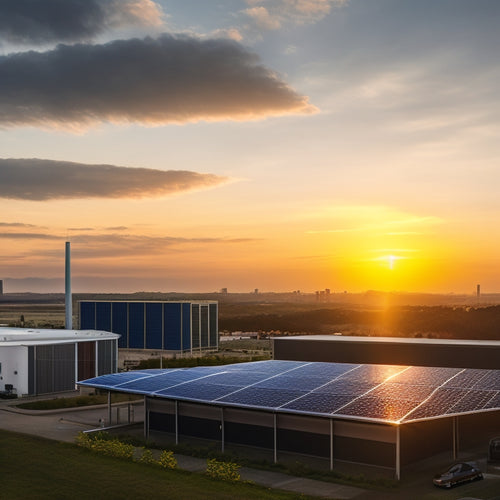
Solar Battery Back Up
Share
You experience at least one power outage per year, on average, and a solar battery backup system guarantees you have a reliable source of energy during these outages, providing a seamless shift to backup power for your essential appliances and systems. This means you'll prevent food spoilage, protect your electronics, and maintain control over your energy use. By integrating battery storage, you'll maximize your renewable energy output and gain independence from the grid. As you investigate your solar battery backup options, you'll want to take into account factors like deep cycle battery technology, power needs assessment, and performance optimization - and that's just the beginning.
The Essentials
- Solar battery backup systems provide seamless power transition during grid failures, ensuring continued operation of essential appliances and systems.
- Deep cycle batteries are designed for repeated charge/discharge cycles, maximizing usable capacity and reliability for solar backup systems.
- Identifying essential appliances and analyzing power usage patterns helps determine the necessary wattage for outages and optimizes battery backup systems.
- Regular maintenance, including efficiency monitoring, ensures optimal performance and energy independence, reducing replacement frequency and total cost of ownership.
- Solar battery systems eliminate dependence on the grid, enabling personal energy generation and storage from renewable sources and promoting peace of mind and energy security.
Reliable Power During Outages
When the grid goes down, you need a reliable source of power to keep your essential systems running. A solar battery backup system guarantees you have power when you need it, providing a seamless shift during outages.
With a backup system in place, you'll have peace of mind knowing you're prepared for any crisis that may arise. By preventing costly losses due to food spoilage and damage to electronics Power Outage Protection, you can rest confident that your home and family are safe and secure.
Power When You Need
During extended power outages, your solar battery backup system kicks in, providing reliable electricity to your home or business. This means you can continue to access essential appliances, lighting, and heating or cooling systems without interruption.
By integrating a battery storage system into your solar setup, you'll unlock the full potential of renewable energy and create a more sustainable, dependable, and cost-effective power solution Renewable Energy Storage. Your system's battery efficiency guarantees that stored solar energy is employed effectively, providing power when you need it most.
With a solar battery backup, you're no longer reliant on the grid, giving you freedom from power outages and uncertainty.
The installation process is designed to seamlessly integrate with your existing solar panel system and grid connection. This allows you to store excess energy generated during the day for use during outages or at night.
By utilizing renewable resources, you're not only reducing your environmental impact but also realizing cost savings through reduced energy consumption. Regular maintenance tips can help guarantee your system operates at peak performance, providing you with peace of mind and energy independence.
Backup During Crisis
Most households experience at least one power outage annually, and many of these outages can last for hours or even days. You understand the significance of crisis preparedness and emergency planning, especially when it comes to home safety.
A solar battery backup system is a reliable solution to guarantee you have power when you need it most. In fact, a reliable battery backup for home can prevent food spoilage and maintain safety by keeping essential home systems, such as refrigeration and lighting, functioning smoothly during unexpected power outages.
Additionally, it can protect sensitive electronics from damaging power surges and data loss, providing homeowners with peace of mind and saving them from costly repair or replacement expenses. During a blackout, your solar panels continue to generate electricity, and your energy storage system kicks in to provide a steady flow of power.
This means you can maintain your daily routine, keep your food fresh, and stay connected with the outside world. By investing in a solar battery backup system, you're reducing your grid dependence and embracing sustainability practices.
In the face of a crisis, you'll appreciate the peace of mind that comes with knowing you have a reliable source of power. Your blackout strategies will be more effective, and you'll be better equipped to handle any emergency situation.
With a solar battery backup system, you're taking an essential step towards energy independence and securing your home's safety during uncertain times.
Increased Energy Independence
With a solar battery back up, you're no longer at the mercy of the grid, allowing you to power on your terms.
You'll have the freedom to generate and store your own energy, reducing your reliance on external power sources. This means you can enjoy uninterrupted electricity, even during outages, giving you complete control over your energy usage.
Power On Your Terms
As you shift to a solar-powered lifestyle, you're not just reducing your reliance on the grid - you're gaining the freedom to power your home on your own terms. With energy storage solutions, you can capture the power of renewable sources like solar and wind to fuel your daily life. This shift towards sustainable solutions not only reduces your environmental impact but also provides cost savings in the long run.
Here's a breakdown of the benefits you can expect:
| Feature | Benefit | Description |
|---|---|---|
| Grid Integration | Energy Flexibility | Seamlessly switch between grid power and solar energy |
| Smart Technology | Automated Energy Management | Optimize energy usage and storage with advanced algorithms |
| Home Automation | Customized Energy Control | Personalize your energy setup to fit your lifestyle |
| Solar Efficiency | Maximized Energy Harvesting | Get the most out of your solar panels with advanced inverters |
| Installation Tips | Smooth Setup Experience | Follow expert guidance for a hassle-free installation process |
Freedom From Outages
By severing your reliance on the grid, you're shielding yourself from the unpredictability of traditional power sources, and solar battery backup systems grant you the autonomy to power your home even when the grid fails.
With solar battery backup, you're taking a proactive approach to outage preparedness, ensuring that your energy needs are met even during extended grid outages. This increased energy independence translates to enhanced energy security, allowing you to maintain your daily routine without interruption.
When the grid goes down, your solar battery backup system kicks in, providing a seamless shift to backup power. This means you can continue to power critical appliances, such as refrigeration, lighting, and medical equipment, without interruption.
By investing in solar battery backup, you're not only protecting yourself from the financial and emotional impacts of outages but also gaining peace of mind knowing that you're prepared for any situation.
With solar battery backup, you're taking control of your energy future and enjoying the freedom that comes with it.
Deep Cycle Battery Technology
You'll need to understand the battery cycle life of your deep cycle batteries to maximize their performance and lifespan.
A deep cycle battery's ability to withstand repeated charge and discharge cycles is critical in a solar battery backup system. When selecting a deep cycle battery, consider the high-performance batteries required for ideal energy storage and reduced reliance on the grid.
Battery Cycle Life
Deep cycle batteries, designed to repeatedly charge and discharge, rely heavily on their cycle life to guarantee reliable backup power. You need to understand the factors that affect your battery's lifespan to assure you get the most out of your solar battery backup system.
Several key factors impact your battery's cycle life. These include:
| Factor | Impact on Cycle Life |
|---|---|
| Battery Maintenance | Regular maintenance can increase cycle life by up to 20% |
| Charging Efficiency | Inefficient charging can reduce cycle life by up to 15% |
| Temperature Impact | Operating temperatures above 25°C can reduce cycle life by up to 5% |
| Discharge Rates | High discharge rates can reduce cycle life by up to 10% |
| Usage Frequency | Frequent deep discharges can reduce cycle life by up to 8% |
Properly managing these factors will help you maximize your battery's energy density and capacity, assuring you get the most out of your solar battery backup system. By monitoring performance metrics and adapting to environmental factors, you can extend your battery's lifespan and enjoy reliable backup power when you need it most.
Deep Cycle Benefits
Optimizing your solar battery backup system's performance relies on understanding the benefits of deep cycle battery technology. You'll want to take advantage of the deep cycle advantages that come with this technology.
One significant benefit is the ability to deeply discharge your batteries without damaging them. This means you can use more of the battery's capacity, reducing the number of batteries you need to purchase. Deep cycle batteries are also designed to withstand the rigors of daily charge and discharge cycles, making them a reliable choice for your solar battery backup system.
When it comes to battery maintenance, deep cycle batteries are relatively low maintenance. They're designed to handle the repetitive charge and discharge cycles, which means you won't need to perform frequent maintenance tasks. This frees up your time to focus on other aspects of your off-grid lifestyle.
Additionally, deep cycle batteries have a longer lifespan compared to other types of batteries, which means you'll replace them less often. Overall, deep cycle battery technology offers several benefits that can enhance your solar battery backup system's performance and reliability.
Check Your Wattage Needs
You'll need to identify the essential appliances you want to power during an outage, as they'll dictate your required wattage.
Consider systems like the Tesla Powerwall and Lithium-ion battery systems(https://www.illchanterthislater.com) that provide reliable energy during outages.
To do this, consider your power usage patterns, including the number of hours you'll need to run each appliance and their individual wattage ratings.
Essential Appliances Only
When sizing a solar battery backup system, prioritizing essential appliances is important to guarantee you're meeting your most critical energy needs during an outage. You'll want to focus on the appliances that matter most, making certain your energy efficiency and appliance compatibility are optimized.
| Essential Appliances | Wattage Needs |
|---|---|
| Refrigerator | 100-200W |
| Medical Equipment | 50-100W |
| Communication Devices | 10-50W |
Consider the wattage requirements of each essential appliance and prioritize them accordingly. For instance, if you or a family member relies on medical equipment, you'll want to make sure that's covered first. Next, you might prioritize your refrigerator to keep food from spoiling. Finally, communication devices like phones and radios can help you stay informed during an outage. By focusing on these essential appliances, you can rest assured that your solar battery backup system will provide the energy you need when you need it most.
Power Usage Patterns
Certain households exhibit unique power usage patterns, depending on factors like family size, lifestyle, and personal preferences.
To guarantee a seamless solar battery back-up system, you need to understand your energy consumption habits. Analyze your usage trends to identify peak hours, when you consume the most power. This will help you optimize your load management strategy.
Efficiency monitoring tools can provide significant revelations into your energy consumption, enabling you to make informed decisions about your renewable integration. By understanding your demand response, you can adjust your energy usage during peak hours, reducing strain on the grid and minimizing the likelihood of power outages.
Grid interaction is essential, as it enables energy forecasting and consumption analysis. This data-driven approach allows you to fine-tune your solar battery back-up system, ensuring it meets your specific needs.
Longer Cycle Life Guaranteed
You'll want a solar battery backup system that guarantees your batteries last as long as possible, and that's where enhanced battery durability comes in.
By selecting a system with a longer cycle life guarantee, you'll get more charge and discharge cycles out of your batteries, reducing the need for frequent replacements.
This means you'll enjoy a lower total cost of ownership and a reduced environmental impact over time.
Enhanced Battery Durability
Advanced solar battery backup systems boast enhanced battery durability, guaranteeing a longer cycle life through innovative design and materials. You benefit from a reliable power supply, even during extended grid outages. This means you'll have the freedom to live life on your own terms, without worrying about power interruptions.
The secret to this enhanced durability lies in state-of-the-art solar battery innovations. Manufacturers have developed advanced materials and designs that reduce wear and tear on the battery. This results in a longer lifespan, with some batteries lasting up to 15 years or more.
You'll enjoy a significant reduction in maintenance costs and a lower risk of battery failure. By following simple battery maintenance tips, such as monitoring charging cycles and keeping the battery clean, you can extend the life of your solar battery even further.
With an enhanced durable solar battery, you'll have the peace of mind that comes with knowing you're prepared for any situation, whether it's a minor power outage or an extended emergency.
Frequently Asked Questions
Can I Add More Batteries to My Existing Solar System Later?
You can expand your existing system's battery capacity later, but it's vital to reflect on the installation process and compatibility with your current setup to guarantee a seamless integration and maximize energy independence.
Are Solar Battery Backups Compatible With All Types of Solar Panels?
You'll find that most solar panels are compatible with battery backups, but you'll need to guarantee the installation is compatible and consider battery efficiency to maximize your energy freedom, regardless of the panel type you choose.
Do I Need a Special License to Install a Solar Battery Backup?
Before diving into solar battery backup installation, you'll need to steer through subtleties, namely installation regulations and licensing requirements, which vary by region, so you'll want to verify local permits and certifications required for a seamless, stress-free setup.
Can I Use My Solar Battery Backup to Charge My Electric Vehicle?
When charging your electric vehicle, you'll want to take into account the charging efficiency and battery capacity to maximize the process. You can use your solar battery backup, but it's crucial to verify the system can handle the increased load and optimize energy distribution.
Will My Solar Battery Backup Work During a Grid Failure at Night?
During a grid failure at night, you'll need a system that provides nighttime functionality, ensuring you're not left in the dark; with a capable setup, you'll achieve grid independence, freeing you from reliance on the grid's whims.
Final Thoughts
You'll never be left in the dark again with a solar battery backup! Imagine having power for days, even weeks, during outages - it's like having your own personal energy superhero. With deep cycle battery technology, you'll get longer cycle life guaranteed, and by checking your wattage needs, you'll be energy-independent in no time. Say goodbye to frustrating blackouts and hello to reliable power, 24/7!
Related Posts
-

Top 10 Off Grid Camping Gear Must-Haves
When you're off-grid camping, the right gear is crucial for a smooth expedition. Start with a durable, weather-resist...
-

Fastest Solar Chargers for Emergency Power
When choosing the fastest solar chargers for emergency power, you need to focus on features like rapid charging capab...
-

Advantages of Commercial Solar Battery On-Site Storage
By investing in a commercial solar battery on-site storage system, you can greatly reduce your energy grid dependence...


